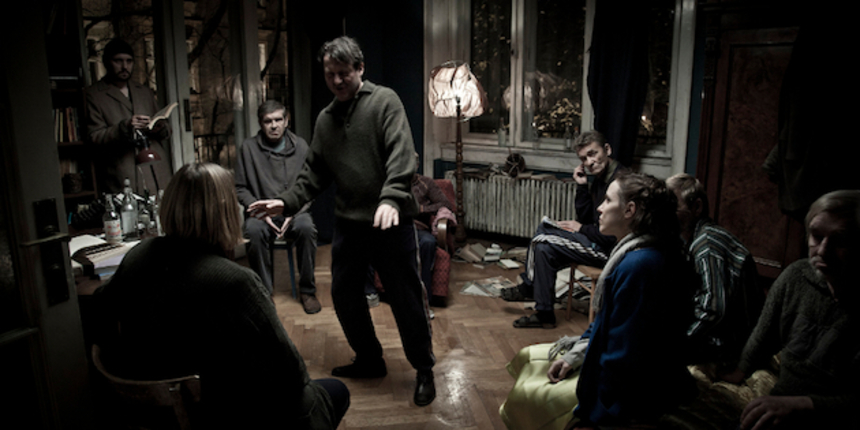Review: THE STRONG ANGEL INN Has A Serious Drinking Problem

Undeniably, cinematic history is filled with unforgettable and strikingly valuable pictures that tried to expose the problem through very vivid imagery and gut-wrenching narratives that were often meant to work as respectable and provocative cautionary tales. Films such as Leaving Las Vegas, Days of Wine and Roses, The Lost Weekend (my personal favorite), Trainspotting, or Shame cover various sides of the terrifying disease that is addiction in most expressive and often groundbreaking ways, and their importance should never be questioned.
I won't be exaggerating, however, when I say that Wojciech Smarzowski's latest venture into the gruesome world of alcoholism makes The Lost Weekend look like a Disney film. Polish people like to drink and that's a well-known fact. Their style of drinking, though, is much different than the one popular in other parts of the globe. A troubling tendency to overdrink in the early days is often the cause of alcohol abuse in the future. But what's more horrifying is that most people don't even see the problem, hence they don't know when to stop. Hangover kicking in usually means more drinking. As the main character points out: '(...) and when I drink the last shot I drink even more, because I've never actually drank the last shot'.
The Strong Angel Inn (Pod mocnym aniołem) is perhaps the most hard-hitting and sickening film about addiction I've ever seen. I believe there are only two ways, in which one can respond to the picture: either by drinking vodka right after leaving the auditorium or by saying: 'My God, I'll never touch alcohol again'. Whichever one you choose, it still says much about the actual impact that the story has on a person's psyche.
Based on a short story novel by Jerzy Pilch, The Strong Angel Inn tells the story of Jerzy (Robert Wieckiewicz), a longtime alcoholic, whose life slowly starts to change when he meets a beautiful and caring, albeit fairly gullible woman (Julia Kijowska). In a series of dramatized vignettes that depict many of Jerzy's drinking bouts, juxtaposed with his frequent visits in a rehabilitation center, the viewer somehow gets under the skin of the protagonist's alter ego, a sort of common sense that tries to keep his sanity intact throughout many tragicomic sequences that don't necessarily have happy endings.
Using Jerzy's alcohol-fueled outbursts as a catalyst, The Strong Angel Inn begins to reveal its even darker side by introducing new characters (played by many Smarzowski regulars) with past experiences so sick and twisted that there's nothing left to do but laugh. The director finds a fine line between what's repulsive and what's simply ridiculous, giving the subject matter a very balanced touch. The film works perfectly as a cautionary tale, of course, but it's never too serious for its own good. Although the side stories told in rehab sessions are very uneven and often plunge into derisive territory, there is a lot of spot-on hilarious scenes that sometimes overplay the actual problem that they focus on, but in a very typical manner known from Smarzowski's earlier works, to which he sometimes refers in a very deliberate manner that might definitely please all his fans.
Although rarely confusing, non-linear narrative gives the film a much-needed sense of disorder and chaos. Shreds of many disconnected scenes lie around without any rational explanation, yet there's something tempting about their lack of suitable place in time and space. What would otherwise be a rather unwanted technique becomes surprisingly consistent and thoughtful, given the director's straightforward vision. Smarzowski creates a universe where alcohol is the king, its powers are unprecedented, and the main character's fate has been sealed for a long time. There are some uplifting moments, but they don't last long, and their presence makes the whole tale even more depressing and pitiful. He eventually breaks the barrier by merging elements of reality and fiction into one condensed storyline. Perhaps one of the best examples is a scene where Jerzy walks from the rehab center straight into his own room in the other part of town and immediately starts drinking.
It's not Robert Wieckiewicz's first role as an alcoholic (Wszystko bedzie dobrze), but this time he seriously overdid himself. In every scene distinctly realistic, his performance shows how to push one's limit. Romantic, sensual, well-spoken, but never beastly, he's almost like a perfect example of how an alcoholic behaves in many states that he goes through during days and nights of drinking to oblivion. I wouldn't say I felt empathy towards his character, but I was in much awe almost every time he came back from the dead straight into a world where vodka isn't a problem but only a solution to many of life's problems. Only then does Wieckiewicz show how a seemingly monotonous alcohol-powered journey might turn into a provocative and distressing odyssey of a soul who's forgotten what it really means to be alive. He's always the center of attention, yet the story makes him less of a human and more of a prop meant to carry a grievous message about the actual consequences of alcoholism.
Beyond being an offensive and often disgusting picture, where bodily fluids have as much screen time as the people that dispose of them, The Strong Angel Inn is a very well-acted and cleverly designed film about the darkest side of addiction. What's crucial to note is that there aren't any light-hearted moments; everything's painfully down-to-earth and even the elements of the narrative that seem clearly exaggerated never fail to terrify.
Drinking might be fun at times, but in Smarzowski's universe there's no place for enjoyment. No one is spared and even the most deserving souls aren't able to find redemption. The Strong Angel Inn invites you to have a drink, but be prepared to stay for more than just one round.

Do you feel this content is inappropriate or infringes upon your rights? Click here to report it, or see our DMCA policy.






